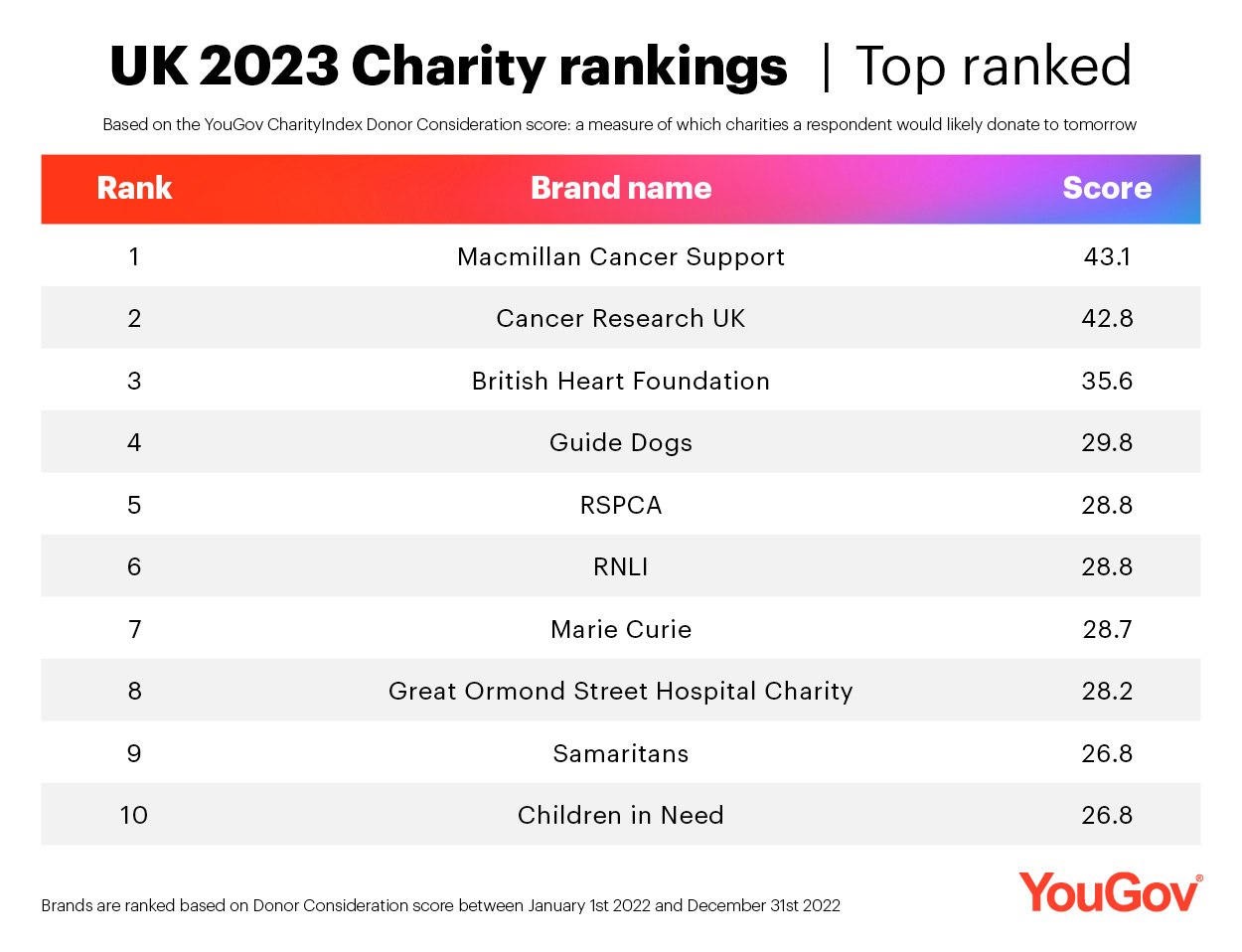Charity Reports and Statistics
Charity Reports and Statistics
This snapshot focuses on the health and status of charities themselves and contains highlights of CAF’s Charity Resilience Index, YouGov’s Charity Index Ranking and a collaboration between nfpResearch and CharityComms to deliver a new version of the Charity Communications Benchmark.
The Charities Aid Foundation (CAF) is a leading charity operating in the UK and internationally. The charity is acutely aware of the financial strain people are facing and the increasing demands this is placing on Charities while facing their own financial challenges and the resilience of the charity sector has never been more important. CAF produces and publishes The Charity Resilience Index which focuses on three key dimensions: charity income, demand for services, and operational costs. Their wider research into charity resilience, charity finance, and changes in giving habits provides further evidence of the challenges that charities are facing.
Key findings:
MOST CHARITIES HAVE SEEN AN INCREASE IN DEMAND FOR THEIR SERVICES
In January 2023, nearly 3 in 5 (57%) charities reported that demand had increased compared to the same time last year, including a quarter (24%) of charities who say that it has increased ‘a lot’. The research indicates that charities working for the prevention or relief of poverty are particularly likely to report an increase in demand for services.
ONLY ONE IN THREE CHARITIES ARE HIGHLY CONFIDENT IN THEIR FUNDING
A third (31%) of charities are very confident that their current funding is secure, whilst around half are confident that they have the funds to meet current demand. Less than 2 in 5 are confident that they can afford to maintain their staffing levels over the next year (36%) or have a plan for maintaining or growing their income over the next 12 months (37%).
MORE THAN HALF OF CHARITIES ARE WORRIED ABOUT THEIR SURVIVAL
Concern about survival peaked at 60% in December before dropping back in January (53%). The concern is particularly acute among charities involved in support or care services (e.g. those working with disabled people, children or the elderly). Across December and January, around 7 in 10 (71%) of these charities said that they were worried about struggling to survive, compared to 44% of faith-based charities.
CHARITIES IN THE NORTH OF ENGLAND ARE AMONG THE HARDEST HIT
In the North of England, demand has increased for nearly 7 in 10 (67%) charities, and two-fifths (40%) say it has increased substantially (compared to 55% and 24% across the rest of England). Charities in the North (63%) are also significantly more likely to have used their reserves to meet running costs than those based elsewhere in England (50%).
THE CAF CHARITY RESILIENCE INDEX STANDS AT 67%
The sector shows signs of vulnerability as it faces into the cost-of-living crisis, with an Index score of 67%. However, this has risen from 62% in December 2022 indicating that there is a slightly more positive outlook amongst charities in 2023.
Every year YouGov’s Charity Index Rankings Highlights the best performing organisations in the third sector according to their overall brand health.
In 2023 Macmillan claimed first place with a score of 43.1 just above Cancer Research UK with a score of 42.8. The British Red Cross were the most improved with a score of 26.6 up from 23.7.
nfpResearch have collaborated with CharityComms to create a new version of the Communications Benchmark.
CharityComms was launched in 2007 with a mission to improve the standard of communications and champion its role in the sector.
One of their main aims is to provide evidence to help charity communicators benchmark how their organisations are doing, as well as gaining insights into how they feel about your comms and its place in their organisation.
The 2022 report compiles the views of more than 530 comms professionals from charities of all sizes, working at all levels of seniority, and includes insights to help the sector understand the impacts, challenges and opportunities comms professionals really face.
Key findings include:
The value of comms
An increasing numbers of people feel that comms have a good standing in their organisation, with 90% believing that communications are valued, and 72% thinking that comms are a strategic part of the overall operation of the organisation. Almost two-thirds think that comms and fundraising work towards an integrated approach, while 77% feel valued by their CEOs, and almost all CEOs (92%) spend time on comms every week.
Balancing priorities
Comms teams’ top goals have not changed over the past five years and remain raising awareness of their charity‘s services (47%), cause (42%) and brand (39%), as well as engaging communities (37%) and acquiring donors (36%). The challenges in balancing often competing priorities have not changed either, with 38% thinking that a lack of joined-up thinking is one of the major challenges that impairs comms work, along with a lack of understanding comms by others in the organisation.
How data drives effective comms
87% perceive that communications in their organisations are ‘very’ or ‘somewhat’ effective and 81% think that their colleagues perceive their work as effective. While data-driven and impact-measured comms seem to be very relevant in staff’s perception of their own effectiveness, just 44% report that their comms are actually data-driven in practice, with 48% saying they measure the impact of comms effectively.
Looking to the future
Unsurprisingly, the cost-of-living crisis is the most dominant concern for comms professionals, both on a personal level around job security, as well as affecting fundraising and comms targets and creating additional pressure on workloads. Despite the pressures, many also expressed the positive nature of being part of a team or people making a difference and the change their work can make in society.

